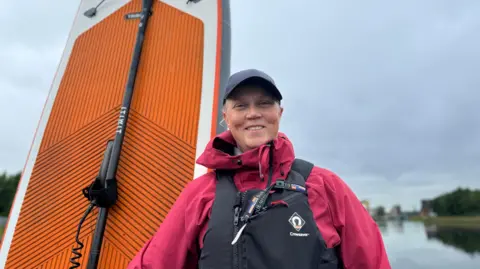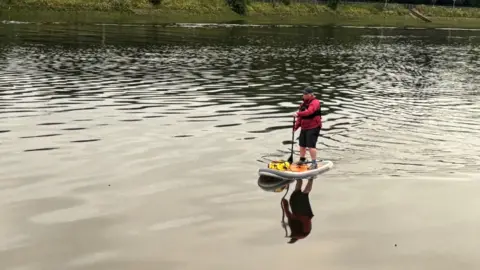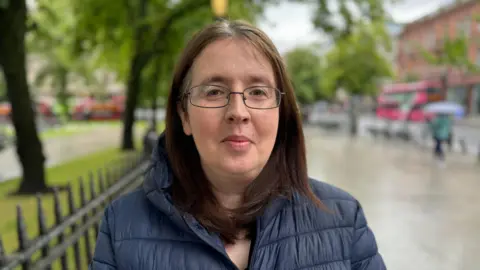Paddleboarding to work is 'not for everyone'
 BBC
BBCWhen Rachel Reid's workplace began an active travel challenge, she dived in—almost literally.
While many of her colleagues cycled or walked at least part of their journey to work, she took to the River Lagan to paddleboard the five miles into Belfast.
"It's a nice way to get to work, it's sustainable, and it's a great way of combining exercise with your daily routine," she said.
The UK's Climate Change Committee advised the transport sector in Northern Ireland should have decreased emissions by 29% by 2030, to include an increased proportion of journeys made by walking and cycling.
But emissions from transport still contributed almost 18.1% of Northern Ireland's total in 2022.
This represents an increase of 7.1% since 1990.

Joining the active travel challenge inspired Rachel to try a few different methods to get to work.
"I've got the bus a few times, I car-shared with my husband a couple of times and cycled quite a few times," she said.
"Then I've paddled three or four times in the last month."
But the statistics show that most people are still heavily reliant on cars.
The Department for Infrastructure carries out an annual travel survey and last December published the most recent figures, which are from 2021.
It found that, on average, every person in Northern Ireland makes more than 800 journeys a year, covering almost 5,000 miles.
Just over two-thirds of those journeys are made by car.
More than a third were less than two miles long; half of them walked, half were driven.
"The statistics don't tell a very good story," said Anne Madden from the charity Sustrans.
"We'd really like to see more people take those short journeys by foot or cycle because we know it is possible, but there's a lot more that could be done to enable that, such as providing safe cycling infrastructure."

Michelle Kelly, head of transport at the Consumer Council, believes consumers are "aware" of the need to reduce emissions.
"Many consumers are switching to more sustainable modes of transport," she continued.
"Having said that, I think more work needs to be done on making consumers more aware, move them away from aspiring to be greener in their travel choices and actually make them willing to sacrifice the reliance on private cars."
For Rachel, climate change is "a big thing" and by not driving her car every day, she feels she is doing "a tiny little bit" to help.
"For me mentally, it's just a lovely way to spend a couple of hours in the morning," she said.
"I feel like I'm on holiday for a couple of hours and then suddenly I'm in work."
Analysis: Paddleboarding to work isn't for everyone
Let's be practical - paddleboarding to work isn't for everyone and it's certainly not possible in the dark months of winter.
Much of Northern Ireland is rural, so using some form of mechanical transport some of the time is largely inevitable.
But we are clearly very reliant on our cars.
And while public transport is also a greener choice - more than 200 Translink buses are zero emission vehicles - it accounted for just 2% of journeys made in 2021.
That's part of a wider discussion around fare pricing and accessibility, but if we can make choices that involve doing even part of a journey on foot or by cycle, or possibly not making that journey at all, those individual actions are part of a bigger whole which helps contribute to reducing our overall emissions.
